
Brought to you by the Architects’ Journal. AJ sustainability editor Hattie Hartman and co-host Rachael Owens talk to changemakers and innovators who are transforming architecture by designing in ways that respect planetary boundaries. Nominated for Audio Content of the Year at the PPA Awards 2025. Show notes & more info here: https://www.architectsjournal.co.uk/podcasts
Episodes
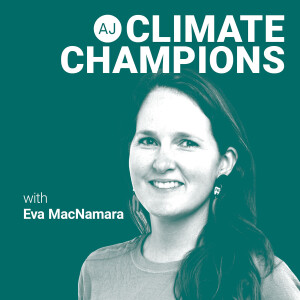
Wednesday Mar 27, 2024
‘Over-specification of concrete is an industry addiction’
Wednesday Mar 27, 2024
Wednesday Mar 27, 2024
Episode 48. AJ Climate Champions with Hattie Hartman and Joe Jack Williams. Structural engineer Eva MacNamara of Expedition Engineering explains how we can radically reduce our use of concrete and how to better understand the biodiversity impacts of material choices.
In this episode, we dive into the tricky topic of concrete and unpick the widespread mantra that ‘concrete is bad’. Concrete is ‘an addiction’ that has led to an obese construction industry, says Expedition’s MacNamara; it is not going to go away but we can radically reduce our use of it. She describes a porposed slab design for the Eden Project site in Dundee which would achieve an 80% reduction in concrete volume.
MacNamara stresses that ‘using less’ is much more impactful than substituting low-carbon concretes and notes that she repeatedly sees practitioners over-specifying. We discuss some of the nuances of concrete use: which applications are most appropriate, how to reduce the volumes we use, and why low-carbon concrete – especially GGBS – is not a silver bullet. We also touch on upcoming innovations including Seratech, ‘funnel’ slabs and smart crushing.
McNamara explains how to bring both carbon and biodiversity into the concrete procurement process. Highlighting findings from the recent report The Embodied Biodiversity Impacts of Construction Materials (Expedition/ICE, November 2023), she notes that 95% of biodiversity impacts occur off site and that the new biodiversity net gain requirements only address the 5% on site, so designers must look beyond a site’s boundary.
Finally, MacNamara advocates finding a place to innovate on every project. ‘We can make the most difference by using our projects as springboards for incubating innovation,’ she says.
For show notes and to catch up on all AJ Climate Champions episodes, click here.
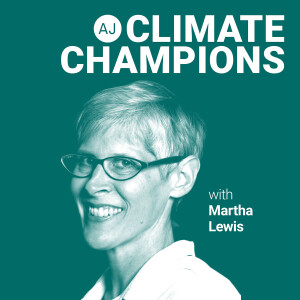
Wednesday Mar 13, 2024
Henning Larsen’s Martha Lewis on how to screen materials for both chemicals and carbon
Wednesday Mar 13, 2024
Wednesday Mar 13, 2024
For the first in a new six-part series on materials, Hattie is joined by co-host Joe Jack Williams to interview Martha Lewis, head of materials at Danish practice Henning Larsen.
Lewis argues that a baseline of health and environmental impacts should inform material specification, and explains why a holistic approach is essential to navigate the nuances of material selection. She describes how the European focus on life cycle analysis and the Global Warming Potential of materials is starting to be integrated with the earlier American focus on healthy materials and toxic chemical content.
‘The glut of information is a challenge of our time. How do we navigate too much information to make the right decisions?’ asks Lewis. She advocates for material passports which would consolidate the relevant data needed to make informed decisions: carbon emissions, chemical content and circularity. She also argues that certification schemes, despite their weaknesses, are the most effective route to ensuring that a project delivers on its sustainability aspirations.
Also in this episode, Lewis describes Unboxing Carbon, a database with an accompanying course which she has developed to upskill architects on the carbon aspects of material selection. Lewis has rolled out Unboxing Carbon across Henning Larsen’s 700-strong practice and also offers it to external practices.
For show notes and to catch up on all AJ Climate Champions episodes, click here.

Thursday Dec 14, 2023
‘I’m no longer the wood weirdo,’ says Andrew Waugh
Thursday Dec 14, 2023
Thursday Dec 14, 2023
Episode 46. AJ Climate Champions with Hattie Hartman and George Morgan. Andrew Waugh explains how building with timber can address industry transformation at scale. ‘I want to transform the whole industry,’ says Waugh, founding director of Waugh Thistleton which was recently named Practice of the Year at the AJ Architecture Awards.
In this episode Waugh explains why tall buildings have no place in sustainable cities of the future; how building housing with timber can reduce its carbon burden by as much as 75%; and why we should stop building basements (they are up to five times as carbon intensive as upper floors).
Waugh advocates building with timber primarily as a low-carbon alternative to concrete and steel, rather than for aesthetic reasons. He shares recent research that clarifies end-of-life alternatives for timber that are not incineration or landfill. He makes it clear that current subsidies that encourage burning of timber for biomass must be revamped to support use of UK-grown timber for construction.
This episode was recorded the day after Waugh toured co-hosts Hattie and George through Waugh Thistleton’s recently completed Black & White Building in Shoreditch. The building is nearly all timber: structure, core, floors, cladding and brise-soleils. Waugh describes where the timber was sourced and that the transport footprint of timber is a relatively minor consideration.
Finally, Waugh explains why he recently withdrew from the Architects Declare steering group.
For show notes and to catch up on all AJ Climate Champions episodes, click here.
With support from the American Hardwood Export Council
A previous version of this podcast mistakenly suggested that Waugh Thistleton had withdrawn from Architects Declare. In fact, Andrew Waugh withdrew from the Architects Declare steering group in May on an individual basis and Waugh Thistleton remains a member of Architects Declare. We apologise for any confusion.
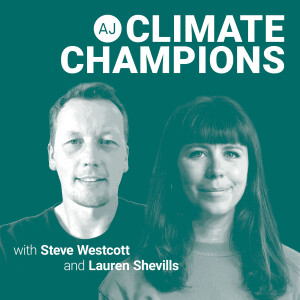
Wednesday Nov 29, 2023
The Public Practice associates driving retrofit and net zero in the public sector
Wednesday Nov 29, 2023
Wednesday Nov 29, 2023
Episode 45. AJ Climate Champions with Hattie Hartman and George Morgan. Two Public Practice associates explain how working in the public sector has increased their agency as designers.
Public Practice is a social enterprise that places built environment professions in the public sector, primarily in place-making roles and increasingly in key roles that drive retrofit and net zero. ACAN co-founder Lauren Shevills, now lead retrofit innovation and delivery officer at Westminster City Council, explains that Public Practice has changed the trajectory of her career, enabling her to marry her passion for community and stakeholder engagement with technical architectural expertise. Steve Westcott, low carbon programme manager at Greater Manchester Combined Authority, says Public Practice has empowered him to work more strategically and ‘be closer to the conversations’ that matter. Off the back of Westcott’s role, GMCA is recruiting additional Public Practice associates.
On the subject of retrofit, Shevills observes that one major challenge is that retrofit cannot be mandated because it’s currently not part of the planning process. A retrofit first policy requires a rethink of current guidance and Westminster Council has five workstreams underway to explore various aspects of retrofit. Westcott explains that a fabric first approach is often too costly. The GMCA is developing portfolio-wide data collection for the city’s non-domestic estate to inform future grant disbursement decisions.
For show notes and to catch up on all AJ Climate Champions episodes, click here.

Wednesday Nov 08, 2023
Je Ahn on setting up Studio Weave and working with found materials
Wednesday Nov 08, 2023
Wednesday Nov 08, 2023
Episode 44. AJ Climate Champions with Hattie Hartman and George Morgan. Studio Weave founding director Je Ahn explains the challenges of sourcing timber from London’s streets and parks.
He describes how he translated the ambition of using local timber from London’s trees into reality at Lea Bridge Library Pavilion despite the fact that no sales channel existed for sourcing local timber and the need to prove its chain of custody because it had no FSC certification.
We also discuss how working with found materials requires a willingness and ability to improvise as a designer and creates new aesthetic opportunities. In the case of Lea Bridge Library Pavilion, this approach lends warmth and informality to the space. ‘You have to be ready to change your mind to suit the requirement,’ says Ahn.
Ahn describes sustainability as project-specific. ‘I’m very interested in where we get our materials,’ he says, explaining that timber is not always the best solution. It’s all about achieving the right balance for a given project. ‘Whatever I put out in the world has to have a purpose beyond what was initially set out,’ says Ahn.
For show notes and to catch up on all AJ Climate Champions episodes, click here.
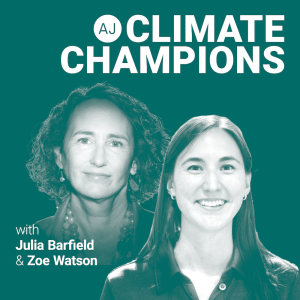
Tuesday Oct 24, 2023
Material passports and Architects Declare four years on
Tuesday Oct 24, 2023
Tuesday Oct 24, 2023
Ep 43. AJ Climate Champions with Hattie Hartman and George Morgan. London Eye architect Julia Barfield explains how the climate emergency changed the way her practice, Marks Barfield, operates, as well as what’s ahead for the Architects Declare movement.
Julia shares insights from recent projects on how to achieve circularity in retrofit, the challenges of stockpiling materials for reuse and how Orms’ material passports can be adapted for retrofit. ‘We must treat all materials as the precious resource they are,’ she says.
She talks about her practice’s Stirling Prize-shortlisted Cambridge Mosque, which is part of a Built by Nature-funded post-occupancy study evaluating the quality of life and performance aspects of five CLT buildings.
We also speak to Julia and fellow Architects Declare steering group member Zoe Watson about what AD has achieved four years on as well as its current workstreams, including climate emergency training for design review panels and Meet the Steering Group sessions where AD signatories can seek practical advice on how to further sustainable design within their own practices.
As part of an ambitious strategy for change, AD is launching a three-part roadmap aimed at equipping Government policymakers with practical and impactful policies to reduce emissions, kickstart the circular economy and restore social and natural infrastructure. AD plans to launch its document in Parliament in 2024.
For show notes and to catch up on all AJ Climate Champions episodes, click here

Thursday Oct 12, 2023
Architects must re-educate themselves on timber sourcing
Thursday Oct 12, 2023
Thursday Oct 12, 2023
Episode 42. AJ Climate Champions with Hattie Hartman and George Morgan. Montreal-based architect and systems thinker Scott Francisco explains why architects must educate themselves to understand the nuances of timber sourcing.
Francisco believes that greater use of timber in construction in coming decades will be essential to meet our climate targets. This in turn means an increase in plantation forestry, but this can be achieved without compromising biodiversity.
He also explains why it’s crucial for designers to have a holistic understanding of the timber supply chain. While timber certification is important, relying on certification alone is not enough. He outlines the range of factors that impact the carbon footprint of timber and how to understand different sourcing strategies.
Architects can play an important role in specifying ecological timber by asking the right questions and educating themselves to understand that specifying a species and a grade is not enough. In some instances, particularly on smaller projects, architects can construct a timber value chain for a particular building.
For show notes and to catch up on all AJ Climate Champions episodes, click here.
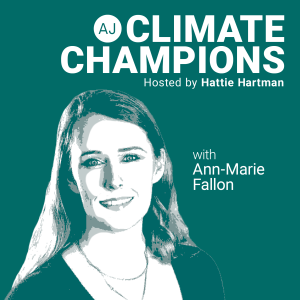
Wednesday Sep 27, 2023
Architype’s Ann-Marie Fallon: ‘Net Zero has almost lost its meaning’
Wednesday Sep 27, 2023
Wednesday Sep 27, 2023
Episode 41. AJ Climate Champions with Hattie Hartman and George Morgan. In this episode, AJ100 Sustainability Champion and Architype associate director Ann-Marie Fallon discusses her belief that delivering net zero is not just technical – understanding how people use buildings and their role in the community is crucial.
We also hear about Architype’s success in influencing policy changes in Scotland, including a Passivhaus equivalence standard for all new housing. Fallon describes the growing community of architectural practices in Scotland pushing for more sustainable outcomes.
Fallon has been instrumental in developing a ‘blended’ approach to retrofit through a nuanced study of the city of Edinburgh’s estate of 300 buildings with a wide variety of building typologies from different eras. This holistic approach involves everything from exploring whether the activities in a particular building can be consolidated and intensified to the nitty gritty of updating mechanical plant.
For full show notes to this episode, go to www.architectsjournal.co.uk/podcasts

Wednesday Jul 26, 2023
‘We apologise for designing buildings that exploit the planet’
Wednesday Jul 26, 2023
Wednesday Jul 26, 2023
Bonus episode. AJ Climate Champions with Hattie Hartman. During an Obel Award panel at the UIA conference in Copenhagen, Heringer seized the opportunity to ask the global audience for ‘forgiveness’ on behalf of architects of the global north.
‘I'm sorry for creating this … ideal of an architecture that was supposed to bring us a comfortable, safe and happy and healthy life, when in fact, it was just exploiting the planet and adding to social injustice,’ she said.
Winner of four important awards since our last interview in episode 6, Anna explains how earthen architecture is gaining traction and describes her ongoing work in Ghana and at the St Michael Campus for Sustainability in Traunstein, Germany.
For show notes to this episode, go to www.architectsjournal.co.uk/podcasts

Wednesday Dec 14, 2022
Chinese architect Xu Tiantian on revitalising rural villages
Wednesday Dec 14, 2022
Wednesday Dec 14, 2022
Episode 40. AJ Climate Champions with Hattie Hartman. In this episode, we explore the global phenomenon of shrinking villages in the countryside, hearing about a remarkable series of interventions in southeastern China by DnA_Design, a small Beijing practice.
Xu advocates a role change for architects in both rural and urban contexts. Architects should no longer accept a commission as given, but take the initiative and evaluate a project’s regional context to make a proposal that is unique and rooted in its place.
In less than a decade, Xu and her team have built more than 20 projects that vary widely in programme and materiality: a tofu factory, a museum, performance spaces and a sugar factory. These projects have attracted new residents back to formerly dilapidated villages by creating jobs and a sense of purpose in these forgotten places.
CHRISTMAS GIVEAWAY Win a copy of Greta Thunberg’s The Climate Book (Penguin 2022). We have two copies to give away. To enter the prize draw, email hattie.hartman@emap.com with your name, address, affiliation and a testimonial about the podcast before 15 January 2023. We will choose the winners in the new year.
For show notes to this episode, go to www.architectsjournal.co.uk/podcasts
